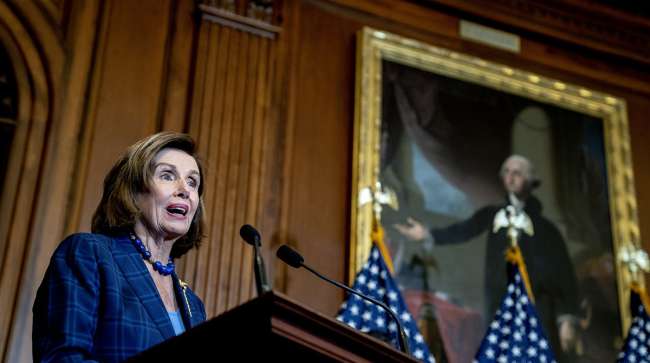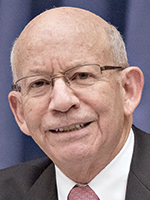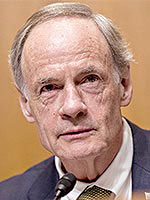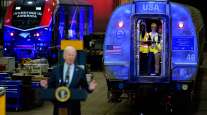Senior Reporter
Transportation Panels Pursue Climate, Clean Energy Priorities in $3.5 Trillion Budget

[Stay on top of transportation news: Get TTNews in your inbox.]
House Speaker Nancy Pelosi is urging Democrats to unify in support of a $3.5 trillion budget proposal that would help advance President Joe Biden’s domestic agenda, including social aid programs and climate change policies.
Pelosi (D-Calif.) said she intends to link passage of the budget reconciliation bill with a Senate-passed $1 trillion infrastructure bill.
“The House must pass the budget resolution immediately,” she told her colleagues among the U.S. House of Representatives Democrats on Aug. 17. “Doing so will maximize the leverage of our caucus in the budget process, allowing us to proceed first in crafting the [budget] reconciliation bill.”
With a vote scheduled for Aug. 23, House Democratic leaders were set to kick off consideration of budget proposals at the committee level.
“Our caucus remains united in realizing President Biden’s vision to build back better: creating more jobs, cutting taxes and lowering health care costs for working families. While the bipartisan [Senate] infrastructure bill offers important progress, it is not reflective of the totality of Democrats’ vision,” Pelosi said.
Rep. Peter DeFazio (D-Ore.), the House’s top transportation policymaker, expressed support for the budget process, noting its potential for the chamber’s transportation committee to advance severe-weather infrastructure resilience policies. “I have consistently advocated for increased federal investment in America’s infrastructure. By investing in our infrastructure, we can create good-paying jobs, support American manufacturing, stop sending jobs to China and strengthen the economy,” he said.

DeFazio
“I’m committed to continuing to fight for transformational funding and policies in the [budget] reconciliation process that will reduce carbon pollution from the transportation sector, support American manufacturing and ingenuity, and create infrastructure that is smarter, safer and made to last,” DeFazio continued.
This month, the Senate gave partisan approval to its budget package, triggering assignments for committees to create a $3.5 trillion budget reconciliation bill. Majority Leader Chuck Schumer (D-N.Y.) pointed to a mid-September deadline for committees to craft their share of the budget bill, which is sponsored by Budget Committee Chairman Bernie Sanders (I-Vt.).
“We will take on the existential threat of climate change by transforming our energy systems toward renewable energy and energy efficiency,” Sanders noted. “With Democrats in control of the Senate, we will use reconciliation to benefit the working class.”
The congressional committees’ legislative packages are designed to be merged into what’s known as a reconciliation bill. That reconciliation measure is meant to avoid a Senate filibuster by necessitating a simple majority for passage. Democrats have 50 senators and a tie-breaking vote in the vice president.
For transportation policy, the Senate’s budget assignment directs the panels with jurisdiction over highways and freight affairs to propose further investments in electric vehicle charging stations, emissions reduction technologies, severe-weather infrastructure resilience projects and environmental research programs.
Specifically, the budget guidelines direct the Senate Commerce Committee, with jurisdiction over trucking policy, to recommend $83 billion for investments in transportation technologies, research, manufacturing and economic development, as well as coastal infrastructure resilience projects.
The Environment and Public Works Committee, with jurisdiction over surface transportation policy, is tasked with proposing $67 billion for environmental justice projects, fuel-efficient ports, climate equity programs, energy efficient buildings and investments in alternative energy vehicles.

Carper
Sen. Tom Carper (D-Del.), chairman of the Environment and Public Works panel, applauded the chamber’s budget assignments: “We move forward with a budget that helps working families in Delaware and across the country, and we should pay for these investments with smart, common-sense policies that ensure that the wealthiest among us are paying their fair share,” he said. “In the days ahead, we’ll need to get to work on legislation laid out in the budget that will tackle the climate crisis, create good-paying jobs, advance environmental justice and build a better, brighter future for all Americans.”
The Environment and Public Works panel’s leadership also emphasized support for robust funding for the Diesel Emissions Reduction Act, affirming “a strong federal commitment to state and local air quality grant programs as a mechanism to assist state and local governments in implementing and complying with federal environmental requirements.”
Over the years, Carper has endorsed the DERA program’s aim of helping put cleaner trucks on the road. Specifically, the program works to reduce older, diesel-powered trucks in operation to facilitate a transition to newer equipment for freight programs along waterways, rails and commercial corridors.
Want more news? Listen to today's daily briefing below or go here for more info:




